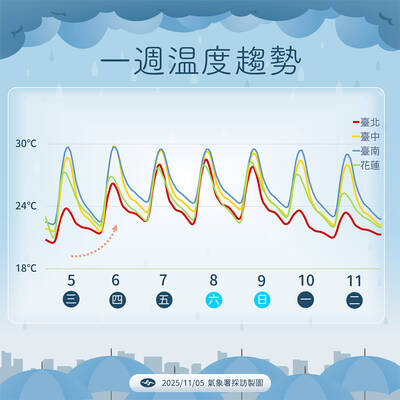The box-office hit Kano has been criticized for “glorifying Japanese colonial rule of Taiwan,” prompting the film’s director to defend his work.
“Let’s leave out the politics. Baseball has universal values. We want to express the idea that ‘Though Taiwan is small, it is strong,’” director Umin Boya (馬志翔) said. “Let’s get reacquainted with ourselves and build up confidence in ourselves.”
The movie has received generally positive reviews, but there have been detractors as well. In recent days, controversy over Kano has boiled over in the media, with some heated discourse.

Photo: Wang Yu-hui, Taipei Times
Earlier this week, the Chinese-language United Daily News and China Times published a letter on the same day, which were signed by one writer surnamed Yen (嚴) and one surnamed Chen (陳), although the contents of the letters were identical. The letters criticized Kano as a distortion of history, sycophantic to the Japanese colonial government and as being made with a Japanese audience in mind.
Over the past two days, a number of netizens have written that the letter was written by Minister of Culture Lung Ying-tai (龍應台) due to the style of writing used and mention of the 1990s civil war in the former Yugoslavia.
When questioned at the Legislature yesterday, Lung denied any involvement with the letter, adding that she was too busy to write to a newspaper.
When asked by lawmakers if she thinks that Kano glorifies Japanese colonial rule, Lung said: “People who write and create their own work must be true to themselves. They should not concern themselves too much with the opinions of the public.”
She added that the ministry handed out NT$75.8 million for Kano’s production because it was made in Taiwan.
Separately yesterday, Boya said that most people thought Taiwanese baseball began in the late 1960s with the rise of the Hongye little league team (紅葉少棒).
Boya told students at a high school in Greater Taichung that Chiayi City’s Kano school team predated the Hongye team.
“They fought against all odds to reach the final of the Japanese high-school Koshien tournament. They did it under very difficult conditions. Unfortunately, the Kano story was not well known... I wanted to direct this movie because it is a heart-warming story,” said Boya, who is from the Sediq Aboriginal community.
The film is based on the true story of a school baseball team from Chiayi City during the 1930s.
“It is all right if you are unsure of your future. Students should always hold on to their sense of curiosity and passion for learning, while following the things they find that are of interest,” Boya said to the students. “When an opportunity arises, you must grasp it and do not let go.”
“It is easy to dream, but to realize your dream can be difficult. You can succeed if you do not give up. Even if the result is not great, you can still be a winner to yourself,” he added.
Kano has earned NT$150 million (US$4.9 million) in Taiwanese theaters since its release two weeks ago.

Three Taiwanese airlines have prohibited passengers from packing Bluetooth earbuds and their charger cases in checked luggage. EVA Air and Uni Air said that Bluetooth earbuds and charger cases are categorized as portable electronic devices, which should be switched off if they are placed in checked luggage based on international aviation safety regulations. They must not be in standby or sleep mode. However, as charging would continue when earbuds are placed in the charger cases, which would contravene international aviation regulations, their cases must be carried as hand luggage, they said. Tigerair Taiwan said that earbud charger cases are equipped

Foreign travelers entering Taiwan on a short layover via Taiwan Taoyuan International Airport are receiving NT$600 gift vouchers from yesterday, the Tourism Administration said, adding that it hopes the incentive would boost tourism consumption at the airport. The program, which allows travelers holding non-Taiwan passports who enter the country during a layover of up to 24 hours to claim a voucher, aims to promote attractions at the airport, the agency said in a statement on Friday. To participate, travelers must sign up on the campaign Web site, the agency said. They can then present their passport and boarding pass for their connecting international

UNILATERAL MOVES: Officials have raised concerns that Beijing could try to exert economic control over Kinmen in a key development plan next year The Civil Aviation Administration (CAA) yesterday said that China has so far failed to provide any information about a new airport expected to open next year that is less than 10km from a Taiwanese airport, raising flight safety concerns. Xiamen Xiangan International Airport is only about 3km at its closest point from the islands in Kinmen County — the scene of on-off fighting during the Cold War — and construction work can be seen and heard clearly from the Taiwan side. In a written statement sent to Reuters, the CAA said that airports close to each other need detailed advanced

UNKNOWN TRAJECTORY: The storm could move in four possible directions, with the fourth option considered the most threatening to Taiwan, meteorologist Lin De-en said A soon-to-be-formed tropical storm east of the Philippines could begin affecting Taiwan on Wednesday next week, the Central Weather Administration (CWA) said yesterday. The storm, to be named Fung-wong (鳳凰), is forecast to approach Taiwan on Tuesday next week and could begin affecting the weather in Taiwan on Wednesday, CWA forecaster Huang En-hung (黃恩鴻) said, adding that its impact might be amplified by the combined effect with the northeast monsoon. As of 2pm yesterday, the system’s center was 2,800km southeast of Oluanbi (鵝鑾鼻). It was moving northwest at 18kph. Meteorologist Lin De-en (林得恩) on Facebook yesterday wrote that the would-be storm is surrounded by